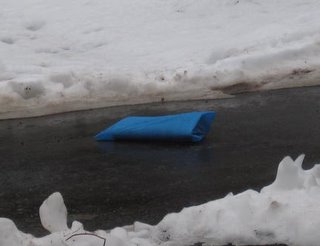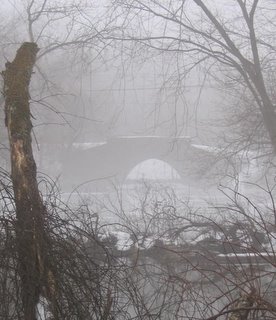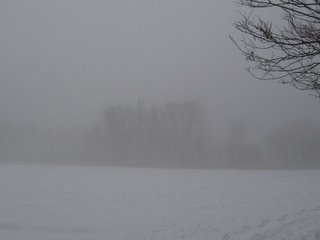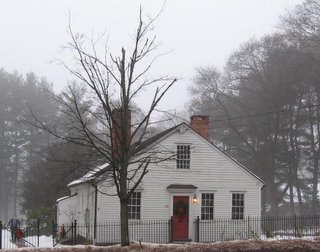When Tine looked at the forecast for the day, before she and Rubob set out on their daily walk, it was a very unusual one: “Unusual day, with rain coming out of season.”
Tine went to check the barograph, but of course it wasn't there, because Tine doesn't have a barograph. So Tine, who one day found herself living in the digital age with the rest of the world, checked the digital barometer.

"It looks like an unusual day, with rain coming out of season," Tine said to Rubob, because Tine is not unversed in the interpretation of meteorological data.
Tine hasn't always relied on a digital barometer for guidance before her walks. Years ago, when she was a little girl -- an especially little girl, in fact -- she used to check the barograph, which sat under a glass case on a table in her uncle's apartment in an old hotel. They'd take a look at the revolving roll of graph paper, and depending on its squiggly lines, Tine and her uncle would choose to take their long walk in the Meadows by the river, or their short walk on the racetrack that lay within a bend in the river.
The barometer suggested a short walk today, and as it happened, Tine preferred a brief one today, too, because she was busy at home, working her way through a pot of Cranberry Autumn Blend tea. The pleasures of the outdoors seemed pale by comparison, especially on an unusually gray day.
But also as it happened, Tine's mind was still preoccupied with the river where she'd nearly perished on an ice floe earlier this week. Yesterday Tine had insisted on visiting the gravestone of Foone, a member of the crew of the Amistad who'd drowned in the river while swimming with friends. Today Tine wanted to see the bridge over the river that Foone took to the Meadows to farm with the other African men from the Amistad.
"I think we'll go down to the Meadows today," Tine said to Rubob. "It'll make a nice change from the cemetery, and there'll be a pleasant view of the river and fields."
As they set off down the driveway, Tine revisted the patch of mud that had so intrigued her yesterday.

"Filth," she said to Rubob. "But it bears a remarkable resemblance to the British Isles (where Tine's uncle lives). They must be undergoing a thaw. As an Anglophile, that might interest you, Rubob."
But Rubob professed no great interest in mud and urged Tine on.
"As much can be learned from a patch of mud as from my digital barometer," Tine thought to herself, endeavoring to catch up with Rubob. "I should check the mud each morning."
Tine's next object of interest was an an uncollected newspaper lying on a driveway.

"They haven't opened their Times yet," Tine said to Rubob. "Imagine that. " Rubob retrieved his newpaper first thing every morning.
As they walked on, heading down Hatter's Lane, Tine said, "It's funny how our walks unfold, isn't it, Rubob? Every one is so very different, like the daily newspaper. We haven't unwrapped this one yet."
At the end of the lane, across the village's main road, the old hatter's cottages were shrouded in mist.

"It's a most unusual day," Tine said to Rubob, who was absorbed in thoughts of his own, perhaps thoughts on all the news he'd unwrapped with his newspaper this morning.
Rubub had been following with great interest the recovery of a prime minister from a stroke and the hearings on a nominee for the Supreme Court. For him, walks were also a time to reflect on the news of the day.
"Do you know the lyrics to that song?" Tine asked Rubob.
"What song?" Rubob said absently.
"There's only one thing to say/ It's a most unusual, most unusual /Most unusual day," Tine sang. "I know that part at least."
"It's a foggy day in London town, too," she said. "I viewed the morning/ With much alarm /The british museum/ Had lost it’s charm."
"Don't you think it has lost its charm, Rubob?"
"Yes, Tine," Rubob said distractedly.
The two passed Oldgate, a grand old yellow house that was the home of Julia Cowles. Julia had kept a diary about her life in the late 1700s, and it had been published in 1931. Tine had a treasured copy of the book.
A large truck waited while Tine stood back in what Rubob called "the well-trafficked road" and admired the house from a distance.

The gate was open, and Tine said, "I think I read that it's always kept open. It's a tradition, a way of saying that guests are always welcome."
"Is it really?" Rubob said, no doubt ruminating on the prime minister's career and on his successor.

"The symbol on the gate is Chinese," Rubob. "It means infinite prosperity."
Tine took such an interest in the grand old yellow house, of course, because Julia had lived there. From age 12 to 17, Julia had written all about her life in the village -- the dances, her carriage rides to school, her teachers and books, her horse rides in the Meadows. She'd died before she'd reached 18, after suffering from poor health for years.
"Maybe one of those windows is hers," Tine said to Rubob.

Tine and Rubob turned down Meadow Road and passed by the Lewis Walpole Library.
"It's undergoing some sort of renovation and expansion," Rubob said. "I read it in the paper the other day. "Maybe it's going to be open to the public now."
"For little people, like us," Tine said.
"Speaking of renovations, there was a very interesting story in the newspaper today about the Ocean House Hotel in Watch Hill, Tine," Rubob continued.
The sprawling old yellow hotel is -- or
was, as it turned out -- a landmark on the shore at Watch Hill, a summer resort town in Rhode Island. Tine and Rubob had sailed by it many times in their doughty little sailboat,
Puffin."They're tearing it down, Tine," Rubob said.
"What?" Tine asked, alarmed. "The old yellow hotel?"
"The investor who bought it, Royce, the mutual fund owner -- he's going to rebuild a replica, but how much of a replica, I don't know. It won't have as many rooms, and part of it will be condominiums."
"I thought he was going to preserve it, Rubob," Tine said. "That's what they said at the used bookstore. Remember the woman at Books and Tackle who knew the investor? She said he planned to keep it just the way it was, the way it's always been."
"The story in the paper said the wooden trusses in the frame had deteriorated too much, Tine," Rubob said. "Everything was too decrepit."
"Detritus," Tine said, thinking of the Christmas trees they'd see on the curb the day before.
"They're going to preserve some of the architectural details, like the front door and the reception desk," Rubob said. "Maybe the hotel will look much the same after it's rebuilt, but I don't see how it could, with so many fewer rooms."
"What about the porch with the columns, and the view?" Tine asked.
"I don't know, Tine," Rubob said.
"That was our landmark on the way home, the yellow hotel," Tine said. "We entered Fishers Island Sound there. "
"We'll be lost in the fog," she said, "like the hotel, lost in the fog of time. She and Rubob walked in the road, avoiding the banks of snow at the roadside.
As they continued down Meadow Road, it was clear that they weren't going to see much of the Meadows today.
"Shrouded in mist," Tine said as they approached the stone bridge.

"It's the bridge Foone crossed to go to the fields to farm," Tine said to Rubob, "while he and the other Africans waited to return home to Sierra Leone. I wonder whether they used the old yellow hotel as a landmark when they sailed into Long Island Sound."
"Nothing seems quite solid today," Rubob said, gazing at the bridge. "It's like everything is between a liquid and a solid -- vaporous."
"Maybe we're back in the underworld," Tine said.
"It's more like Limbo," Rubob said -- "though the Catholic Church seems to have put Limbo in limbo, as Harold Bloom said in the Times."

Tine had read the article, too, because Rubob had left it on her chair.
She recalled Bloom writing that Anthony Burgess had said to him, "When you arrive in Limbo, I will await you there with a bottle of Fundador.''
"There's no seeing today where Foone worked in the Meadows, Rubob," Tine said. "It's all lost in the mist. I don't expect they'd have done much farming today anyway."

"We could go back for a bottle of Fundador," Tine said, feeling enervated by the mist.
"A bottle of what, Tine?" Rubob asked.
But they didn't turn back for an invigorating draught of Fundador. Tine and Rubob took the path along the bank of the Pequabuck River, which ran into the Farmington River after a few hundred yards.

"Watch out for wraiths," Tine said to Rubob. "You're my Virgil."
But Rubob, for some reason or other, was thinking of a book based on another classical character, Ulysses (who met Virgil in the underworld, as it happened).
"Phantasms," Rubob said. "It's like the phantasmagoric part in 'Ulysses,' Tine."
"He's always thinking about that book, trying to make sense of it," Tine thought.
"Phantasmagoric, Rubob?"
"It's a dream-like sequence, where Bloom goes after Stephen in a brothel, in the 'Circe' episode. It's ethereal, hallucinogenic, phantasmagoric."
"No wonder Ulysses was in the Inferno, what with his doing drugs in a brothel." Tine said, her head in something of a whirl (as it often is when Rubob talks about "Ulysses.").
"Stephen winds up smashing a chandelier," Rubob continued. "It's a climactic moment in the novel. 'Time’s ... final flame leaps and, in the ... darkness, ruin of all space, shattered glass and toppling masonry.' That's all I remember, Tine, something like that."
They walked to where the two streams met, where Tine was pleased to see a family of ducks, just visible through the tree branches.

Feeling somewhat refreshed by this sign of life on the river, Tine led Rubob back the way they'd come on the snowy path. It wasn't long before the arch of bridge came into view again.

"It's almost a Romaneque arch, isn't it?" Rubob said. "That's the gift of the Romans to us, Tine -- the beautifully rounded arch. The Gothic arch is so much more peaked."
"I thought the bridge would be my arch over the mists of time, to Foone's Meadows," Tine said to Rubob. "But it's an unusual day. There's not much to see even of the present. Most of it has vanished."
"Only the trusses are showing, and they're deteriorating," Tine thought to herself. "Don't tell Mr. Royce, or he'd bring his wrecking crew and builders to the Meadows," she thought of telling Rubob, but he'd started to vanish in the mist, too.
"Rubob?"
He was behind her, still admiring the arch of the bridge from a distance. "I wonder why there weren't rounded arches like the Romanesque ones before the Romans," he said. "It seems such a natural arch. Are they hard to build? That must be it."
As they got closer to the bridge, Rubob said, " 'She said archly,' -- That's a big phrase in Jane Austen, Tine. "Something would be said with a raised eyebrow."
"My uncle used to say things like that," Tine said -- "I mean with a raised eyebrow, like this," and she did her best to raise one eyebrow.
"It's like he's right here with me," Tine thought to herself, remembering her uncle. "The barograph, the walks in the Meadows, the raised eyebrow -- and talking with Rubob, too. It brings it all back, through the mists of time."
"It's a most unusual day," she thought, gazing into the mist over the Meadows one last time before they walked back over the bridge toward home.

Tine and Rubob passed Oldgate, Julia's old yellow house, again, and it must have reminded Rubob of the Ocean House Hotel.
"I don't see why condominium owners would want to share their beach with hotel guests," he said. "It doesn't seem like such a great idea, if you ask me. Who would want a condominium in a hotel? The building would be neither public nor private, neither fish nor fowl."
"I don't know, Rubob, but everything is like that today," Tine said.
"I mean between one thing and another," she continued, "like you said earlier. They could build an arch between the hotel and the condominiums, between the new and the old." Tine raised an eyebrow archly and chuckled.
They passed the hatter's cottage again and made their way quietly home in the mist.

A dog barked at them from somewhere deep within the fog.
"The hound of the Baskervilles," Rubob said.
"The hant of the Baskervilles," Tine said.
"What's a 'hant,' Tine?"
"A haunting spirit, Rubob -- the ghost of the hound of the Baskervilles."
"In a way," Tine thought as she arrived home, "it was a most unusual walk, but all in all, a very pleasant walk."





















